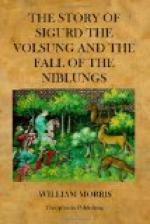“But next unto Otter
my brother he gave the snare and the net,
And the longing to wend through
the wild-wood, and wade the highways
wet:
And the foot that never resteth,
while aught be left alive
That hath cunning to match
man’s cunning or might with his might to
strive.
“And to me, the least
and the youngest, what gift for the slaying of
ease?
Save the grief that remembers
the past, and the fear that the future
sees;
And the hammer and fashioning-iron,
and the living coal of fire;
And the craft that createth
a semblance, and fails of the heart’s
desire;
And the toil that each dawning
quickens and the task that is never
done;
And the heart that longeth
ever, nor will look to the deed that is won.
“Thus gave my father
the gifts that might never be taken again;
Far worse were we now than
the Gods, and but little better than men.
But yet of our ancient might
one thing had we left us still:
We had craft to change our
semblance, and could shift us at our will
Into bodies of the beast-kind,
or fowl, or fishes cold;
For belike no fixed semblance
we had in the days of old,
Till the Gods were waxen busy,
and all things their form must take
That knew of good and evil,
and longed to gather and make.
“So dwelt we, brethren
and father; and Fafnir my brother fared
As the scourge and compeller
of all things, and left no wrong undared;
But for me, I toiled and I
toiled; and fair grew my father’s house;
But writhen and foul were
the hands that had made it glorious;
And the love of women left
me, and the fame of sword and shield:
And the sun and the winds
of heaven, and the fowl and the grass of
the field
Were grown as the tools of
my smithy; and all the world I knew,
And the glories that lie beyond
it, and whitherward all things drew;
And myself a little fragment
amidst it all I saw,
Grim, cold-heart, and unmighty
as the tempest-driven straw.
—Let be.—For
Otter my brother saw seldom field or fold,
And he oftenest used that
custom, whereof e’en now I told,
And would shift his shape
with the wood-beasts and the things of land
and sea;
And he knew what joy their
hearts had, and what they longed to be,
And their dim-eyed understanding,
and his wood-craft waxed so great,
That he seemed the king of
the creatures and their very mortal fate.
“Now as the years won
over three folk of the heavenly halls
Grew aweary of sleepless sloth,
and the day that nought befalls;
And they fain would look on
the earth, and their latest handiwork,
And turn the fine gold over,
lest a flaw therein should lurk.
And the three were the heart-wise
Odin, the Father of the Slain,




